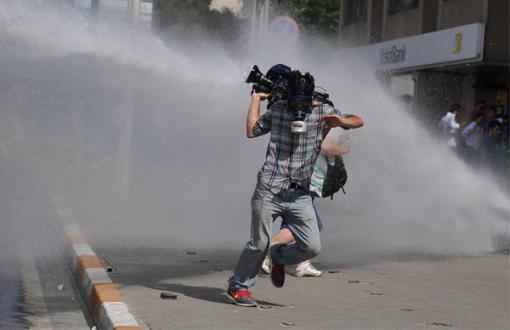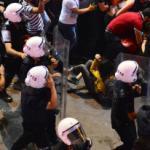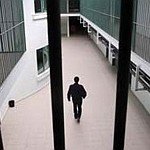“We hope that 2015 will be a year where the right to live and not be tortured is respected, the media, the internet, freedom of thought and expression in any medium are not disturbed and where these can be used in public squares, and where tear gas and of course bribery and corruption leave our lives.”
The introduction section of Turkey Human Rights Association’s (TİHV) report titled “Turkey Human Rights Association 2014” ends with this sentence.
The following subheadings are included in the 337-page report signed Evren Özer, prepared with the contribution of TİHV’s Treatment and Rehabilitation Centers in Adana, Ankara, Diyarbakır, İstanbul and İzmir and of volunteers at the association: The right to live, lawsuits, mass grave excavations, operations in South-Eastern Turkey, landmines, political murders, racist-discriminatory assaults, job safety, suspicious soldier deaths, other developments-cases.
The report stated: “The mine accident in Soma that could easily be defined as a massacre, as well as news of workers’ deaths from all over the country were some of the most important violations reported in 2014.”
Prominent evaluations from the report are as follows:
What changed in the regulations? |
The harbinger of the steps the AKP government would take to eradicate the effect of the Gülen movement in the police and judiciary was the HSYK amendment. However, when the Constitutional Court rejected the amendment approved on 26 February 2014, a new one was made at the end of the year. Along with the amendment claimed to bring HSYK's operation, structure and members into the supervision of the executive function, the condition of "concrete and strong evidence" for the detainment of persons featured in the Law of Criminal Procedure –included in the Democratization Package and claimed to have been introduced in order to avoid operations such as the one on 17-25 December– was also changed back to its prior form of "reasonable doubt" in the new regulation. Along with this proposal was the removal of attorneys' access limitations to files on 21 February 2014. With this change too, 8 months sufficed to return to the old version. |
Torture and TİHK |
However many times the AKP government called for "zero tolerance for torture", practices of torture and ill treatment by the police did not end in 2014. To the contrary, the police's various interventions on social demonstrations, which constituted torture carried to the street, became all the more visible and damaging. Deaths and injuries resulting from tear inducing chemical agents led human rights organizations to make repeated calls for a "ban on the use of tear gas". Myriad organizations, Turkey Human Rights Association in particular, petitioned for years for Turkey to accede to the Optional Protocol to the Convention of Torture (OPCAT) and to develop accordingly its National Prevention Mechanism in order to prevent practices of torture before they occur. Accepting OPCAT, the Government announced that the function of the National Prevention Mechanism made up of independent experts and required to agree with the Paris Principles for all of the places where people are locked up and deprived of their freedoms, had been given with a Council of Ministers Decree effective 28 January 2014 to Turkey Human Rights Organization (TİHK), a dependent government organization in every sense. |
Kobanê protests and the internal security package |
Kobanê protests led to the death of many people due to Islamist parties' or groups' reactions to or the police's interventions in the demonstrations that began in numerous different cities of Turkey on 6 October 2015. Around the same period, the President gave the signal of the new amendment that would pave the way for new extrajudicial executions and that the public would be discussing for months as the "internal security package" in a public speech on 10 September 2014 during his visit to Trabzon district. Reacting to the Kobanê protests and claiming they resemble the Gezi Park protests, the President used the following words while speaking to a crowd: "What is our police going to do against all these? Is it still going to hold up a shield? Our soldiers and our police will do whatever is necessary. All the necessary precautions will be taken after the 14th (October 14). Necessary amendments in the greatest measure will be made to the laws." Government spokesman Bülent Arınç said the following on the date specified by the President: "We think the powers given to the police are not enough. The need for an extensive internal security reform has arisen. The decision to continue the preparations predicating standards on the powers in Germany has come to be accepted." Details relating to the "internal security package" that suddenly appeared on the agenda slowly materialized in October. According to these, the government was clearing the way for the police to detain people upon suspicion, for covering one's face in protests to justify arrest, and for shooting people who use Molotov cocktails without giving a warning first. |
Sick prisoners |
A new amendment under the name of favorable regulations for sick prisoners was passed in 2014. While explaining this "favorable" regulation, Justice Minister Bekir Bozdağ said that with the TCK and Law on Making Amendments to Certain Laws article 79 and the subsection added to Law no. 5275 article 16 adding the criteria for grave and concrete danger onto the element of danger, the adjournment of the execution of sentences received by inmates who cannot sustain their lives alone due to a grave illness or a disability and who do not constitute a grave and concrete danger for society was being adjusted. With the introduction of these two previously absent criteria, many inmates' requests for discharge were rejected, and treatment consequently obstructed. While the treatment of sick prisoners is certainly one of prisons' most important problems, the fact that the inmate population has increased threefold in 12 years must also be viewed as a disconcerting situation. |
Click here to read the article in Turkish.






